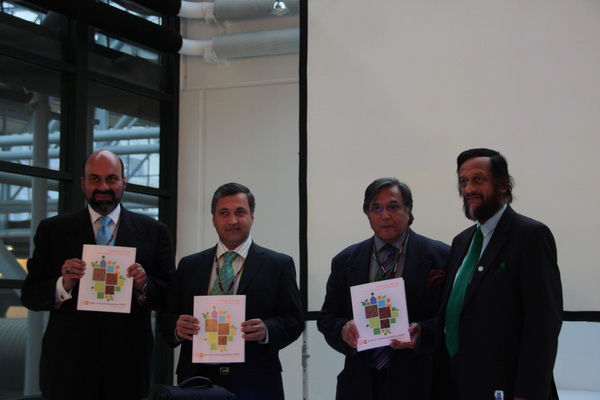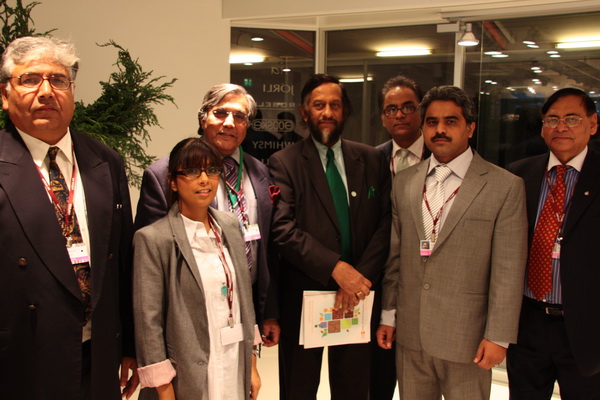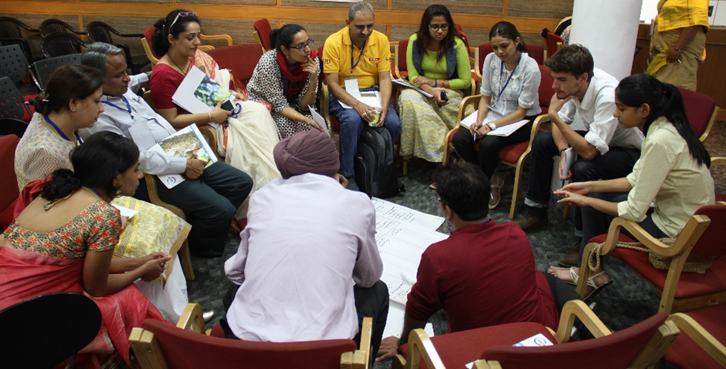Climate Change and Vulnerability Challenges in Pakistan
Ministry of Environment, Government of Pakistan in collaborations with IUCN, International Union for Conservation and Natural Resources - Pakistan organized a press brief on the sidelines of the Copenhagen Climate Change Conference.
Pakistan’s vulnerabilities to Climate Change were highlighted by the speakers.
The guests were welcomed by Shah Murad Aliani, Country Representative IUCN Pakistan who introduced the programme.
Dr. Arshad Muhammad Khan, Executive Directory of the Global Change Impact studies Centre highlighted the impacts of climate change in Pakistan and said that Pakistan’s concerns included increased variability of monsoon, receding of Himalayan glacier’s likely impact on Indus River system flows, decreased capacity of water reservoirs and extreme events including floods and droughts. He said that climate change would induce severe water stress, and Pakistan will face food insecurity due to decreasing agricultural production. He also highlighted the degradation of ecosystems, biodiversity loss and saline water intrusion in the aquifers.
Malik Amin Asalm, Former Minister of state for Environment said Pakistan was highly vulnerable to climate change due to its geo- political and geographic placement. He said the current negotiations at COP 15 are going to determine the construct of future scenario of global climate change policy, upon which Pakistan must be strategically aligned to avail itself to emerging opportunities. He said that Pakistan needs immediate assistance of environment friendly technology transfer, capacity building, support in promoting Clean Development Mechanism for mitigating climate change and financing to adapt in sectors of agriculture, water and disasters.
Noted economist, Dr. Pervaiz Amir said Pakistan faced multiple threats and its unique front line status puts it in a key position of a country with threatened environment. The threats go beyond glacier melt in the Himalayas and Karakorum as it would also face serious consequences from sea level rise threatening Karachi, Thatta and Badin and the coastline. Key assets like Gwader Port and the Coastal Highway would need extra protection. He said Pakistan needs to go all out in increasing its green cover by bringing new areas under plantation especially on farms, improving forest cover and improving management of the trees. Floods, drought sand storms are forecasted with agriculture, water, energy, health as sectors requiring priority action.
Deal or no deal, Dr Amir said countries would still have to allocate resources to adapt and do this quickly. Climate change will challenge the socio-economic fabric of the country and suggested that a National Adaptation center would be a good starting point to cover all the major hotspots.
Dr. Rajendra Kumar Pachauri, Chair of the Intergovernmental Panel on Climate Change thanked the Government of Pakistan for organizing this event. He said all developing countries and particularly counties in the Asian sub Region will be facing severe consequences from impacts of changing climate. Dr. Pauchari said the countries in South Asia must adopt a common position to project their immediate needs to combat climate without which these countries may not achieve developmental targets.
Minister for Environment, Afghanistan, Mostapha Zaher, said climate change was posing a threat to all countries. Poor countries were most prone to the imminent threat. He said that this would have tremendous security implications and people would not accept any political or administrative boundaries that would further aggravate the problem. Thus there was a need to move on a fast track jointly manner to address the issue.
Dr. Tariq Banuri, Director of Department of Economics and Social Affairs at the United Nations, Dr. Andreas Schild, Director General, International centre for Integrated Mountain Development, Mostapha Zaher, Minister for Environment, Afghanistan, Federal Minister for Environment Hameed Ullah Jan Afridi, Dr. Ishfaq Ahmad, Advisor Science & Technology and Minister of State for Planning Commission. Pakistan’s Ambassador in Germany, Shahid Kamal, and Pakistan’s to Denmark were also present on the occasion.
For more information, please contact:
Afia Salam
Coordinator, Education, Communications & Outreach
Focal Person Business and BioDiversity
IUCNP
1 Bath Island Road
Clifton
Karachi 75530
Tel: 92 (21) 5861540/41/42
Fax: 92 (21) 5861448
Cell: 0300 9223019
0345-2006610
www.iucnp.org
About IUCN
IUCN, the International Union for Conservation of Nature, helps the world find pragmatic solutions to our most pressing environment and development challenges by supporting scientific research; managing field projects all over the world; and bringing governments, NGOs, the UN, international conventions and companies together to develop policy, laws and best practice.
The world's oldest and largest global environmental network, IUCN is a democratic membership union with more than 1,000 government and NGO member organizations, and almost 11,000 volunteer scientists and experts in some 160 countries. IUCN's work is supported by over 1,000 professional staff in 60 offices and hundreds of partners in public, NGO and private sectors around the world. IUCN's headquarters are located in Gland, near Geneva, in Switzerland.
www.iucn.org





